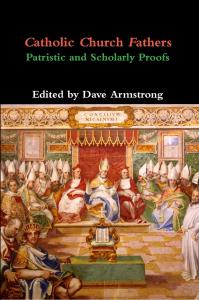[link for book and purchase information]
I dealt with this topic at length with Reformed Protestant apologist Matt Hedges (Pope St. Clement of Rome & Papal Authority, 7-28-21). As of this date he has not yet answered it. Today I discovered some instances of Protestant anti-Catholic apologist Jason Engwer making the same argument. So I’ll revisit the topic and address his dubious claims. Jason’s words will be in blue. Those he cites for his argument will be in green and brown.
I was banned long ago from the Tribalblogue site where Jason writes, and he has long since decided to ignore any counter-replies I make (what else is new with anti-Catholics?). In the past, it was very different. He made several replies, and we even had a debate at the large anti-Catholic site CARM: that he decided to depart long before it was finished. Just for the sake of background information . . . I have posted many refutations of Jason in his section on my Anti-Catholicism web page.
*****
First Clement . . . [is] one of the earliest extra-Biblical Christian documents we have, and it represents early Christianity in the city of Rome. It has a lot of relevance to the claims of Roman Catholicism. I’ve written about some of the inconsistencies between First Clement and Catholicism in the past. (“First Clement And Pope Francis”, 3-14-13).
In this same article he cites two men to back up his position:
Some scholars anachronistically saw in the epistle [First Clement] an assertion of Roman primacy, but nowadays a hermeneutic of collegiality is more widely accepted. (Thomas Halton, Encyclopedia Of Early Christianity, Everett Ferguson, ed. [New York: Garland Publishing, Inc., 1999], 253)
This [the literary genre of First Clement] is a form of address that is identified in rhetorical handbooks and found in other texts that are contemporary with 1 Clement. It is used by those who wish to persuade others to reach for themselves a successful resolution to difficulties that they face, not to force them to submit to those who offer them this counsel….He [Clement] hopes to persuade because he cannot compel or command, and he knows that he cannot take it for granted that those whom he addresses will welcome and act on the counsel that he gives. He avoids the use of the imperative, and speaks instead in the second person plural….The second corollary is confirmation that this letter [First Clement] offers no evidence for the primacy of Rome at the time of its composition. The church at Rome writes to the church at Corinth of its own free will, but the form in which it does so makes clear that it could not take for granted that its counsel would be either welcome or in any way binding at Corinth. Nowhere does the Roman church demand obedience to its own authority, but only to that of God, as revealed in the Greek Bible and in certain Christian texts and traditions. (Andrew Gregory, in Paul Foster, ed., The Writings Of The Apostolic Fathers [New York, New York: T&T Clark, 2007], 26-28)
Let’s take a closer look at these claims. 1 Clement expressly contradicts them, and I contend that they are special pleading.
St. Clement writes (I use the standard [Protestant] Schaff translation):
If, however, any shall disobey the words spoken by Him through us, let them know that they will involve themselves in transgression and serious danger; . . . (59, my bolding and italics)
Joy and gladness will you afford us, if you become obedient to the words written by us and through the Holy Spirit root out the lawless wrath of your jealousy according to the intercession which we have made for peace and unity in this letter. (63, my bolding and italics)
Clement definitely asserts his authority over the Corinthian church far away. Again, the question is: “why?” What sense does that make in a Protestant-type ecclesiology where every region is autonomous and there is supposedly no hierarchical authority in the Christian Church? Why must they obey the bishop from another region? Not only does Clement assert strong authority; he also claims that Jesus and the Holy Spirit are speaking “through” him.
That is extraordinary, and very similar to what we see in the Jerusalem Council in Acts 15:28 (“For it has seemed good to the Holy Spirit and to us to lay upon you no greater burden than these necessary things”: RSV) and in Scripture itself. It’s not strictly inspiration but it is sure something akin to infallibility (divine protection from error and the pope as a unique mouthpiece of, or representative of God).
Catholics maintain that the Jerusalem Council is an exercise of conciliar authority in conjunction with the pope (Peter), and that 1 Clement is analogous to a papal encyclical (a pope authoritatively acting on his own).
Andrew Gregory claims that Pope Clement wishes only “to persuade . . . not to force them to submit” and that “he cannot compel or command.” “He avoids the use of the imperative” and “could not take for granted that [his] counsel would be either welcome or in any way binding at Corinth.” Supposedly, “Nowhere does the Roman church demand obedience to its own authority.”
This is simply (to put it mildly) not true to the excerpts above, which assert authority in the very strongest terms, even claiming that if the advice is disobeyed, the Corinthians would “involve themselves in transgression and serious danger.” Pope Clement claims that God is speaking “through” him (“words spoken by Him through us”). This is not mere friendly, brotherly persuasion, folks!
It’s the language of binding authority (in effect straight from God via His pope), accompanied by a penalty if it’s not heeded. Gregory can repeat his claims as many times as he wants, but it doesn’t overcome the plain facts of the text of 1 Clement, that expressly contradicts his contentions.
Moreover, Max Lackmann, a Lutheran, makes the observation:
Clement, as the spokesman of the whole People of God . . . admonishes the Church of Corinth in serious, authoritative and brotherly tones to correct the internal abuses of their ecclesiastical community. He censures, exhorts, cautions, entreats . . . The use of the expression send back in the statement: Send back speedily unto us our messengers (1 Clement 65,1), is not merely a special kind of biblical phrase but also a form of Roman imperial command. The Roman judge in a province of the empire sent back a messenger or a packet of documents to the imperial capital or to the court of the emperor (Acts 25:21). Clement of Rome doubtless also knew this administrative terminology of the imperial government and used it effectively. (In Hans Asmussen, et al, The Unfinished Reformation, translated by Robert J. Olsen, Notre Dame, Indiana: Fides Publishers Association, 1961, 84-85)
The essential questions remain: why does Corinth have to obey Rome? Who determined that set-up? Why does Clement casually assume that they should and must obey him, and that it would be “transgression and serious danger” if they don’t?
Jason adds in his article, “Was The Papacy Established By Christ? (Part 2)” (6-24-06):
Clement of Rome, the earliest church father and a Roman bishop, sent a letter to the Corinthian church to counsel them about a dispute involving the leadership of their church. Such letters were common in early Christianity (Ignatius’ letter to Polycarp, Polycarp’s letter to the Philippian church, etc.), and no jurisdictional superiority, much less papal authority, is implied by the sending of such a letter. To the contrary, the letter is written in the name of the church of Rome, not the bishop of Rome, and the letter makes many appeals to various authorities (scripture, Jesus, the apostles, the Holy Spirit, etc.), but never to any papal authority. . . .
It’s important to recognize that the early sources had many opportunities to mention a papacy if they believed in such a concept. When men like Clement of Rome and Tertullian comment on issues of authority and the status of the Roman church without mentioning a papacy, the absence of the concept is significant.
The argument from the use of “church of Rome” rather than something like, “I, Pope Clement, . . .” is a trifle and an irrelevancy. The authority of the two was understood to be the same, and interchangeable, and it was that way from the beginning. Hence, Clement begins, “The church of God which sojourns at Rome, to the church of God sojourning at Corinth, . . .”
Likewise, for example, Pope Pius XI in his 1930 encyclical Casti Cannubii (On Christian Marriage), began with the words: “To the Venerable Brethren, Patriarchs, Primates, Archbishops, Bishops and other Local Ordinaries enjoying Peace and Communion with the Apostolic See.” And he states: “We, looking with paternal eye on the universal world from this Apostolic See as from a watch-tower, . . .”
The “Apostolic See” is, of course, Rome. Similarly, Pope St. Paul VI, in his famous 1968 encyclical, Humanae Vitae, begins as follows: “To the Venerable Patriarchs, Archbishops, Bishops and other local Ordinaries in Peace and Communion with the Apostolic See, . . .”
Pope Clement didn’t have to appeal to papal authority per se (i.e., he didn’t have to use the words “pope” or “pontiff” or “leader of the Church” in reference to himself, etc., just as Jesus didn’t constantly say, I am God, I am God . . .”). He exercised it in what he expressed; how he acted, namely, claiming to speak for God, through the Holy Spirit, and expressing the notion of “transgression and serious danger” should the authority be disobeyed. Therein lies the profound authority, just as in the case of the Jerusalem council.
This argument from Jason, as a result, carries no force at all. He needs to address what I bring up. He hasn’t yet done so. He talks about the document, dancing all around it, but refuses to directly address the language that precisely proves it is “papal” in nature.
Thomas Halton, whom Jason cites above (in brown) argued his position exactly as Jason has: making a pro-Protestant statement about 1 Clement without addressing the key parts of it that prove it isn’t Protestant, and is, rather, papal and ecclesiologically Catholic. If one observes his cited statement in context, one sees that he ignored the portions I highlight.
They need to be addressed. As long as they are not, we may conclude that Protestants (of Jason’s anti-Catholic sort, and even ecumenical ones who hold that Catholics are fellow Christians) are in effect conceding that we are correct, in refusing to deal with these ultra-relevant sections. We contend that Clement was indeed a pope, and was clearly acting like one in this letter.
***
Practical Matters: Perhaps some of my 4,000+ free online articles (the most comprehensive “one-stop” Catholic apologetics site) or fifty books have helped you (by God’s grace) to decide to become Catholic or to return to the Church, or better understand some doctrines and why we believe them.
Or you may believe my work is worthy to support for the purpose of apologetics and evangelism in general. If so, please seriously consider a much-needed financial contribution. I’m always in need of more funds: especially monthly support. “The laborer is worthy of his wages” (1 Tim 5:18, NKJV). 1 December 2021 was my 20th anniversary as a full-time Catholic apologist, and February 2022 marked the 25th anniversary of my blog.
PayPal donations are the easiest: just send to my email address: [email protected]. You’ll see the term “Catholic Used Book Service”, which is my old side-business. To learn about the different methods of contributing, including 100% tax deduction, etc., see my page: About Catholic Apologist Dave Armstrong / Donation Information. Thanks a million from the bottom of my heart!
***
Summary: Protestant anti-Catholic polemicist Jason Engwer flatly refuses to grapple with the most relevant literary facts regarding the question of “Is First Clement Non-Papal?”














